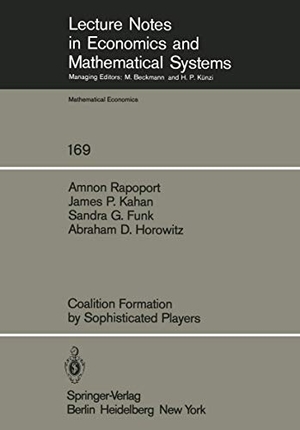Für statistische Zwecke und um bestmögliche Funktionalität zu bieten, speichert diese Website Cookies auf Ihrem Gerät. Das Speichern von Cookies kann in den Browser-Einstellungen deaktiviert werden. Wenn Sie die Website weiter nutzen, stimmen Sie der Verwendung von Cookies zu.
Cookie akzeptieren
A. Rapoport / A. D. Horowitz / S. G. Funk / J. P. Kahan
Coalition Formation by Sophisticated Players
- Springer Berlin Heidelberg
- 1979
- Taschenbuch
- 184 Seiten
- ISBN 9783540092490
The three major aims of the present study were to (a) test some of the major game-theoretic solutions for n-person games in characteristic function form with data obtained from "rational" players; (b) locate, assess, and explain differences between sophisticated and naive subjects in coalition frequencies and payoff disbursements; and (c) provide a common data base for bargaining process analyses and testing of both present and future models. To this end, five quartets of subjects each partici pated in 16 different coalition formation tasks presented as computer-controlled, four-person, characteristic function games with sidepayments. All 20 subjects (a) were relatively mathematically sophisticated, (b) were familiar with the major
Mehr
Weniger
zzgl. Versand
in Kürze